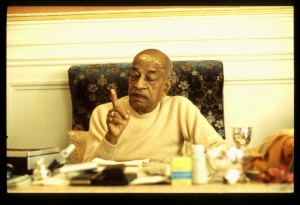CC Antya 9.13 (1975)

A.C. Bhaktivedanta Swami Prabhupada
Below is the 1996 edition text, ready to be substituted with the 1975 one using the compile form.
TEXT 13
- eka-dina loka āsi’ prabhure nivedila
- gopīnāthere ‘baḍa jānā’ cāṅge caḍāila
SYNONYMS
eka-dina—one day; loka—people; āsi’—coming; prabhure—to Śrī Caitanya Mahāprabhu; nivedila—informed; gopīnāthere—Gopīnātha Paṭṭanāyaka; baḍa jānā—the eldest son of King Pratāparudra; cāṅge caḍāila—was raised on the cāṅga.
TRANSLATION
One day people suddenly came to Śrī Caitanya Mahāprabhu and informed Him, “Gopīnātha Paṭṭanāyaka, the son of Bhavānanda Rāya, has been condemned to death by the baḍa-jānā, the eldest son of the King, and has been raised on the cāṅga.
PURPORT
The cāṅga was a device for killing a condemned person. It consisted of a raised platform on which the condemned was made to stand. Underneath the platform, there were stationary upright swords. The condemned man would be pushed down onto the swords, and in this way he would die. For some reason, Gopīnātha Paṭṭanāyaka had been condemned to death and had therefore been raised upon the cāṅga.